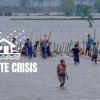Flood in Sylhet is the price we’re paying for ignoring nature

The flood in Sylhet that we are seeing right now is happening due to multiple reasons. As the monsoon season sweeps across Bangladesh, rainfall will naturally increase. Sylhet is the wettest region in the country. Heavy rainfall is a common occurrence there since it is located just below Cherrapunji, which is often called the wettest place on Earth. However, the severity and frequency of flooding in Sylhet and the surrounding areas in the past two years indicate that this is not merely a natural event, but a crisis exacerbated by human actions.
Firstly, the intense rainfall and subsequent floods are indeed influenced by climate change, which is causing abnormal weather patterns and extreme rain in short durations. Every region has a water-carrying capacity—as in how much water it can absorb and channel without flooding. When the rainfall exceeds this capacity, waterlogging and flooding occur, as we have regularly seen in Sylhet.
Sylhet has always been known for its hilly terrain. The region experiences significant rainfall on the high grounds, which then flows down to the lowlands and river basins, our haors. Historically, this water movement was natural, but unplanned and anthropocentric development has disrupted this balance. The region's unique topography and natural habitat have been ignored in the development process, which has led to severe consequences. The huge number of water bodies spread out like spiderwebs have largely been filled up, mostly illegally.
In the high-lying region, illegal hill-cutting has been rampant, with hills often levelled completely so people can build infrastructure. This destroys the natural landscape and reduces the land's ability to manage rainwater, leading to worse flooding. Cutting hills in any way is illegal. However, cutting hills at angles up to 30 degrees is still manageable. Cutting over 45 degrees causes significant damage. But we are cutting hills at 180 degrees—completely levelling them and destroying the area's geographic identity.

We are often inconsiderate of the fact that an area does not belong solely to humans. Sylhet's rich ecosystem includes rivers that traverse national boundaries and sustain both human and other lives. Yet, indiscriminate development has ignored environmental considerations, filling up rivers and ponds, and now water has nowhere left to go. This, coupled with poor drainage systems choked by plastic pollution, exacerbates the flooding problem. We cannot confuse flooding with waterlogging. Flooding is a natural phenomenon. Waterlogging here is largely a result of human error and negligence. If we could control plastic pollution, the drainage system would be more efficient and cause less waterlogging.
For my work, I have travelled to various areas around Sylhet. Historically, Sylhet's elderly and Indigenous people recall that the floods we see today are unheard of. This is because the drastic changes in the landscape, driven by unregulated development, have fundamentally altered the region's ability to handle heavy rainfall. Destruction of the natural ecosystem—flattened hills, filled water bodies—has left the area more vulnerable to heavy floods than ever before.
We are often inconsiderate of the fact that an area does not belong solely to humans. Sylhet's rich ecosystem includes rivers that traverse national boundaries and sustain both human and other lives. Yet, indiscriminate development has ignored environmental considerations, filling up rivers and ponds, and now water has nowhere left to go.
Despite the dire situation, there have been efforts to address the issue of flood in Sylhet primarily through some big-budget projects. However, such large-scale projects have mostly failed, primarily due to a lack of inclusive planning. Effective development must involve all stakeholders—local communities, academic institutions, and environmental organisations. This participatory approach ensures that the unique needs and concerns of the region are considered and addressed.
In international forums like COP, Bangladesh has advocated for climate justice and the establishment of loss and damage funds for vulnerable nations. However, even if these funds are made available, we lack comprehensive plans to mitigate the flooding and waterlogging crises in Sylhet. There is an urgent need for better climate diplomacy and negotiation to secure adequate funding and formulate effective, inclusive strategies.
Our talks and discussions around climate change are largely about economic damages. We also must consider the non-economic losses caused by flooding. Two years ago, I visited some flooded areas around Sylhet. Many of our folk songs that make up our cultural identity are from that region. It broke my heart to learn that the local women and Bauls had lost their song books, either written by themselves or passed down to them for generations, to the floods. The destruction of cultural heritage represents a loss that is immeasurable. These songs, passed down through generations, form an integral part of our identity. When floods destroy such cultural treasures, the loss transcends monetary value.
To address these challenges, we must rethink our development mentality. Sustainable development involves preserving natural landscapes, maintaining forest covers, and protecting river ecosystems. Projects should not only aim for economic growth but also safeguard cultural and environmental heritage. Inclusion of all stakeholders in development projects fosters a sense of ownership and ensures that diverse perspectives are taken into account. When designing big projects, we should select local leaders and representatives with the help of union parishads and city corporations and make an inclusive project that gives everyone ownership. This will also save money and increase efficiency.
The flood in Sylhet highlight the urgent need for a balance between development and environmental conservation. By adopting sustainable practices and inclusive planning, we can mitigate the impact of extreme weather events and protect both our natural and cultural heritage. The time to act is now, for the sake of our environment, our communities, and our future.
As told to Monorom Polok of The Daily Star.
Pavel Partha, an ecology and biodiversity conservation researcher, is director at Bangladesh Resource Centre for Indigenous Knowledge (BARCIK). He can be reached at [email protected].
Views expressed in this article are the author's own.
Follow The Daily Star Opinion on Facebook for the latest opinions, commentaries and analyses by experts and professionals. To contribute your article or letter to The Daily Star Opinion, see our guidelines for submission.

 For all latest news, follow The Daily Star's Google News channel.
For all latest news, follow The Daily Star's Google News channel. 










Comments